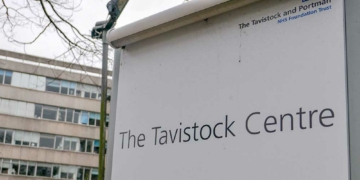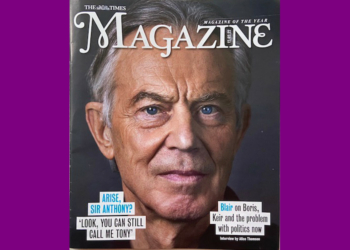Yesterday morning’s BBC interview with Rosie Duffield MP made it embarrassingly obvious, no-one knows what the Labour Party policy is on gender self-identification.
“It would be good to clarify what our position is as a party,” said the member for Canterbury to the Today programme’s 7 million listeners.
Duffield went on to explain why she will not be attending the upcoming party conference. Had she adopted an unpopular stance on carbon emissions or HS2 there would be little controversy, but because Duffield has been open about her belief that women are ‘adult human females’ she is at risk of physical attack.
Labour leader Keir Starmer has not just neglected to condemn the rape and death threats aimed at one of his MPs, he hasn’t managed to find a slot in his diary to discuss the matter of women’s sex-based rights at all. As an exasperated Duffield told Today presenter Justin Webb:
“He’s always positive about trying to organise a meeting, it just hasn’t happened yet. I think it is really necessary that we actually talk about this.”
Earlier this year Starmer did find time to make a short film to mark the start of Pride. In the three-minute video the Labour leader said “Trans people are one of the most discriminated against groups in our society … We’re committed to updating the GRA to introduce gender self-identification for trans people.”
This came as a surprise to many grassroots Labour members, not least because the 2019 manifesto promised to “ensure that the single-sex-based exemptions contained in the Equality Act 2010 are understood and fully enforced in service provision.”
This innocuous-sounding line was secured after a long and bitter campaign by the grassroots group Women’s Place UK (WPUK). For their efforts WPUK were condemned as a “trans-exclusionist hate group” in a pledge drafted by the Labour Campaign for Trans Rights (LCTR). LCTR’s public pledge was signed by 2020 leadership candidates Rebecca Long-Bailey, Emily Thornberry and Lisa Nandy, as well as deputy leadership candidates Angela Rayner and Dawn Butler.
“Women feel the party is abandoning them. They are hanging in there but for how much longer? If Labour want to lay claim to be the party that stands for equality and the protection of women’s rights, then they must change course or we will abandon ship before it sinks.”
Labour Women’s Declaration (LWD) is another gender critical feminist group spurned by party apparatchiks. A spokeswoman for the group told Lesbian and Gay News that they “advocate for many thousands of Labour members” and yet have had their requests to host recognised fringe events rejected and have been prevented from proposing motions. Undeterred, this year they are holding an unofficial event:
“On 28 September during Conference, we are co-hosting a large public meeting which will be attended by hundreds of Labour members including delegates, councillors and politicians. Speakers will include members of our Working Group and Lesbian Labour. Our focus will be on freedom to discuss fairness for women – in sport, in prisons, refuges, everywhere. Pressure is building on the party leadership to start to listen, or else risk more scandals when the truth emerges about the party’s treatment of women and lesbians in particular.”
“Women feel the party is abandoning them. They are hanging in there but for how much longer? If Labour want to lay claim to be the party that stands for equality and the protection of women’s rights, then they must change course or we will abandon ship before it sinks.”
Groups officially affiliated to the Labour Party are pushing hard for gender self-identification. LGBT+ Labour have launched a new Trans Allies Network, and in literature they claim that “the rights trans women seek do not infringe on existing protections for women.”
It is worth noting that what is popularly presented as a being about ‘trans rights’ is more accurately about the abolition of women’s rights. Cut through the hyperbole and claims of ‘literal violence’ and the truth is no-one can change how another chooses to identify, and arguably nor should they. The issue is whether an individual’s stated sense of gender identity ought to be allowed to trump the biological reality of their sex in law. This matters because men are more violent than women; single-sex spaces like refuges and hospital wards offer necessary protection and privacy for women.
What groups like LGBT+ Labour frame as civil rights is in fact the apogee of identity politics; the triumph of individual will above the needs of the majority. Given this, it is perhaps no surprise that in 2018 during the public consultation on reform of the Gender Recognition Act, 136 companies, from Amazon to the Financial Times, signed a Stonewall public statement in support of so-called ‘trans rights’. When comrades and corporations are on the same side, it’s fair to ask ‘who benefits?’
Groups which affirm the importance of sex have been pushed to the margins of the Labour Party. Lesbian Labour are now the only group advocating for same-sex attracted women members, they do so without formal recognition. A spokeswoman told Lesbian and Gay News:
“The Labour Party gets advice from LGBT+ Labour, an affiliated group that does not accept exclusive same sex attraction, we are there to tell them they are wrong.”
But the consequences of the Labour Party’s failure to take a stance against the bullying of those with gender critical beliefs extends beyond the party faithful. Earlier this year former party member Rebekah Wershbale found to her horror that her story had been used by the “Labour Campaign for Trans Rights” as part of a training course. A lesbian and feminist campaigner, Wershbale was barred from a local pub for wearing a T-shirt bearing the words ‘woman; adult human female’. A picture of Wershbale wearing the T-shirt appears on a slide in a Labour Party training course on how to avoid ‘casual transphobia’. She said:
“I’m alarmed that this has been greenlit by the Labour Party, knowing what the potential backlash is for women in my position who refuse to play the game of pretend, and who stand up for women’s rights and biological reality.”
She has yet to receive either an apology or explanation from Labour Party officials.
Disagreement over what was originally a Conservative policy, gender self-identification, has also undermined efforts to increase women’s participation in politics. Initiatives like the Jo Cox Women in Leadership programme and women-only shortlists have become opportunities for males to validate their identities, and for the woke power brokers within the party to make their ‘trans inclusive’ stance clear. To date, more male ‘transwomen’ have graduated from the Jo Cox programme than out ‘gender critical’ feminists.
Should the Labour Party wish to regain respect, and indeed votes, Starmer could do no better than to appoint Duffield to the vacant position of Shadow Minister for Women and Equalities.
Long-established positions have also been impacted. The Shadow Ministerial Women and Equalities post has been described by one unnamed MP as a ‘poisoned chalice’ – it has remained vacant since Marsha de Cordova left earlier this month. Her departure followed criticism that she declined to attend a conference called ‘Labour & LGBT+ rights, where next?’ featuring Stonewall’s chief executive Nancy Kelley, and Alex Beverley and Eden Ladley, LGBT+ Labour’s chairman and trans officer. Charlotte Nichols, MP for Warrington North, has also recently resigned as shadow minister for the same department.
The appointment of Starmer led many to hope that the era of the Momentum bully boys had come to an end. Instead, long-standing women members have continued to be treated with contempt; their intelligence, dedication and expertise has been squandered as worthless. There is more than a whiff of sexism in Starmer’s refusal to engage with what he clearly regards as a ‘fringe women’s issue’. It is surprising that a leader bold enough to take a stance against anti-Semitism is too afraid to even meet with women, let alone to concede that they might have a point.
Starmer has turned a blind-eye as extremist transactivists have ramped-up hatred against those with gender critical beliefs. In failing to act he has not just thrown Rosie Duffield to the wolves, Starmer has let women down everywhere. Should the Labour Party wish to regain respect, and indeed votes, Starmer could do no better than to appoint Duffield to the vacant position of Shadow Minister for Women and Equalities. Such a bold move would not only clarify policy, it would make the ailing and aimless Labour Party relevant once again.
Photo: PA Images/Alamy Stock Photo
























Comments
No comments yet, be the first to leave a comment.